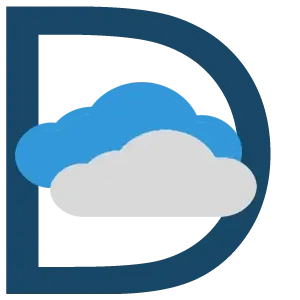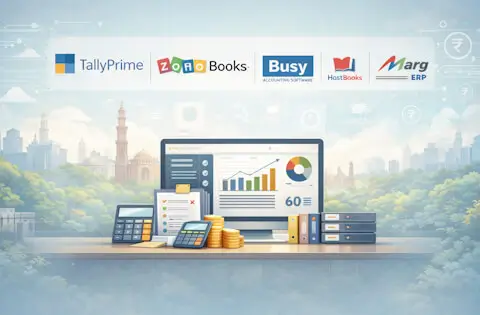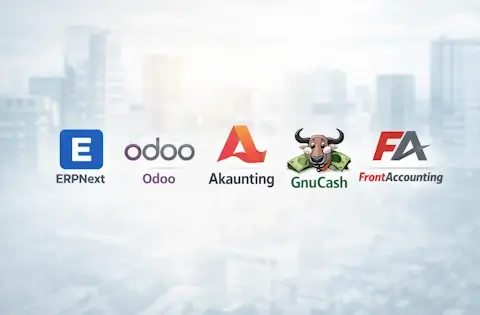What is Online Accounting: Explore 10 Best Features of Accounting Online

Online accounting is the application of Internet technology to manage your books online and use the right accounting tools.
Traditionally manual and paper-based accounting was used for bookkeeping and accounting purposes and then came the computerized desktop applications.
But today the internet plays a big role in lifting accounting to an electronic platform
And that is how e-accounting or online accounting has been taken by storm.
Accounting is the process of recording financial transactions pertaining to businesses.
However, managing these accounts online needs a comprehensive accounting system on the cloud.
Therefore e-accounting or cloud accounting services are offered via SaaS i.e. Software-as-a-service.
Web-based accounting eliminates the need for installation, upgrades, exchanging data files, backup, and disaster recovery.
And it has one goal in common i.e. to increase accounting efficiency and productivity and facilitate the running of the businesses smoothly.
What is Accounting Online?
The process of accounting with the help of internet-based tools and software is referred to as Accounting Online.
However, the term accounting online is used to refer to web-based accounting, cloud accounting, and online Accounting which are interchangeably used.
Accounting online helps businesses, enterprises, startups, and entrepreneurs to easily access their accounting systems on a web browser or through a mobile app.
So it replaces traditional accounting software such as spreadsheets, manual accounting, and even the standalone desktop-based, dos, and Windows accounting systems.
This means that shifting your existing accounting process to the cloud is simply something that you can’t ignore.
Online Accounting facilitates instant decision-making processes in your business because you are able to gain access to your resources anytime anywhere and anywhere.
Most small businesses think shifting online is an additional expense because it involves internet services.
But the reality is, that the cost of data in India is the cheapest in the world.
You cannot grow without technology because it is the only option today that makes our lives better and easier.
So the Internet is not an issue at all, the issue is that most business decision-makers are reluctant to change their existing accounting process online.
Explore 10 Best Features of Online Accounting Systems
Accounting online practically relates to accounting systems, software, and services that are available online.
This means the Internet is the only medium to access these systems and this article describes some of the best web-based accounting features.
Here you go.
1. Online Accounting is Real-time
In the history of business real-time is something that makes web-based accounting most beneficial even for small business owners.
So think of it when your business is large, do you have enough time to run after your accountant or bookkeeper to email a report that you need?
Who doesn’t want to know what is happening inside their business right now?
What stock do they have? What is the current financial position of their company? How are the individual branches and companies doing with the cash flow?
You get all this information updated on your mobile device in real time.
So it does not matter whether you are in your office at home or traveling.
This means with the help of online accounting software getting access to financial data is not a big deal today.
Thus real-time systems provide you with better-informed decisions.
And you are able to make decisions quickly that need the most of your attention.
2. Centralized Data & Collaboration
By centralized data we mean your data is stored in a single location.
Data centralization leads to more meaningful reporting and ensures that the same data is available across all your organization, branches, and companies.
Accounting online enhances business centralized data by being able to provide analytics across dashboards for admin across multiple companies with a single login.
And providing individual users with the windows to view only what they require and the whole process is automatically backed up and upgraded behind the scenes.
Similarly, collaboration is essential for businesses with large users and multiple locations.
If you have data spread out across multiple locations, you will have to generate various reports.
Whenever that happens, it’ll be challenging to see the “bigger picture.”
Online accounting facilitates collaboration with multiple users across multiple branches and locations and can provide authorized access to stored data anytime.
And restricts users from seeing each other data which is a better way to share data securely and seamlessly.
This is the power of collaboration.
3. Online Accounting Simplified Banking
Most accounting software and systems such as Zoho & Quickbooks provide banking integration in real-time.
This means that banking transactions such as deposits and receipts that are either made through NEFT/ RTGS/ IMPS or Cash are automatically fetched in your system.
And, once you set up and integrate your banking rules within the systems the software automatically fetches transactions from the bank feed.
This eliminates the need for manual accounting voucher entries related to the bank’s payments, receipts, and deposits.
So you can match the payments or receipts that occurred in your business to get full control of your financial data anytime.
4. Accounting Online with Inbuilt Inventory
Almost every online accounting software provides an inbuilt inventory that manages your stock during purchases and sales.
This is how the software calculates the real closing stock valuation.
Therefore you can enjoy robust inventory tracking functionality within your accounting software online.
With accounting systems online you can either enter your inventory such as opening stock, entering purchase inventory-wise or making sales inventory-wise.
So every time a transaction occurs such as purchases, stock transfer, dispatch, or sales the inventory is automatically managed in real-time at every location.
Therefore you are able to get the direct benefits of inventory on hand every time you need to know about your stock.
It also caters to a range of different business needs, from manufacturing to trading, e-commerce to retail, and the service industry.
5. Enhanced Consistency & Focus
Consistency is the key to driving your business goals.
E-accounting improves consistency in your business by being able to utilize data and insights that are available in real time.
So business owners can make the best decisions based on the current and informed data and analytics that are more transparent and meaningful.
And, users can focus more on achieving their business goals by enhancing customer experiences rather than spending more time organizing data.
6. Online Accounting Scalability
Scalability is another feature of accounting software online.
So what do you mean by scalability?
Scalability can be interchangeably used to upgrade or migrate accounting software to its latest features, technology, platform, or trends.
This means you start small and as your business grows over time the software grows with you.
Features such as order to cash and procure to pay are already available in most accounting software online.
For example, ZohoBooks, Quickbooks, Realbooks, etc. are the best examples of modern scalable cloud accounting software.
With a scalable accounting system, businesses can add multiple users onboard.
Each user can either work from home, overseas, or in different locations, and office branches share the same data simultaneously with each user under a permission-based set of defined rules.
Moreover, you can restrict IP for users based on a particular location only where they can access the system.
7. Online Accounting Managed Backups
Every business wants to keep a backup of their accounting data as it is one of the precious pieces of information for a business that is gathered over a period of time on the cloud.
So it is a matter of concern for businesses that are not aware of the SaaS-based accounting concept.
If we look at some of the applications such as Zoho, QuickBooks, RealBooks, etc..
You will be able to find that these accounting systems offer some kind of backups in the form of downloads.
However, these downloads are available in the form of Excel spreadsheets or PDFs.
Online accounting apps such as Zoho provide a backup of your accounting data in the form of Excel.
An app such as Realbooks provides a complete book print report in Excel format.
But for most web-based accounting you will not even find any option to backup your accounting files.
Because a cloud-based accounting system eliminates the need for backups.
Although Backup is necessary for you, you do not have to worry about any backup because your data backup recovery and maintenance are all taken care of by the software vendors.
So you never have to back up your files again and focus only on your business.
8. Connect with Third-party Apps online
Most online accounting platforms provide a developer partner program for developing their own apps.
So these developers provide specific applications on the marketplace to integrate third-party software for performing a specific task.
For example, Avalara is a third-party program that deals with one solution to automate GST compliance.
With an online accounting platform, you may connect to Avalara apps to manage all your accounting compliances.
So most web-based accounting systems can connect and synchronize with popular business apps.
Consider a popular accounting app such as ZohoBooks.
With ZohoBooks businesses can connect to third-party apps such as Slack, Zapier, Google GSuite, and Microsoft Office 365.
So a good online accounting software not only provides its own platform but also provides integration with other platforms.
One common integration of online accounting with other platforms is SMS integration for business notifications.
9. Free Software Updates
Online accounting is a subscription-based platform that comes under SaaS i.e. software as a service.
So you only pay fees for the subscription charges either monthly, quarterly, or yearly, but no fees are necessary for the updates and new releases.
As a result, free software updates happen automatically behind the scenes for most web-based applications.
Although SaaS accounting platforms are always up to date, it is the sole responsibility of service providers to stay up-to-date with tax rules and regulations.
So in case, there is any change in tax structure or compliance, the updates happen at the backend automatically.
However, if service providers fail to provide timely updates, subscribers may leave their platform soon and shift to other accounting platforms.
This is one of the strong reasons that SaaS platforms come with necessary updates seamlessly.
Moreover, updates are applicable even for free accounting software online plans.
10. Access Online Accounting Apps Anytime Anywhere
Online accounting apps ensure seamless data transfer across mobile apps on popular platforms such as iOS and Android.
So you can stay connected with your finances at all times on the cloud.
Apps provide real-time intelligent business reports, KPIs, and dashboards, making approvals, and assigning tasks to users.
Thus you can use accounting from anywhere.
And you don’t need to wait for someone to provide you with the reports that you need or go to the office to make an approval.
For Example, with Realbooks apps you can approve a purchase order. Send a complete ledger to your vendors directly from the mobile app on WhatsApp or email.
This eliminates the need to contact your office staff while you are communicating with your client for payments receivable.
On the other hand, QuickBooks and ZohoBooks provide all provisions to carry out transactions on the app.
You can add customers and vendors, create a PO or SO, create a delivery challan, an invoice or bill, record expenses, and view complete reports on your mobile app.
Apps help you manage your business and provide you with an insight that ultimately helps you to transform your business.



